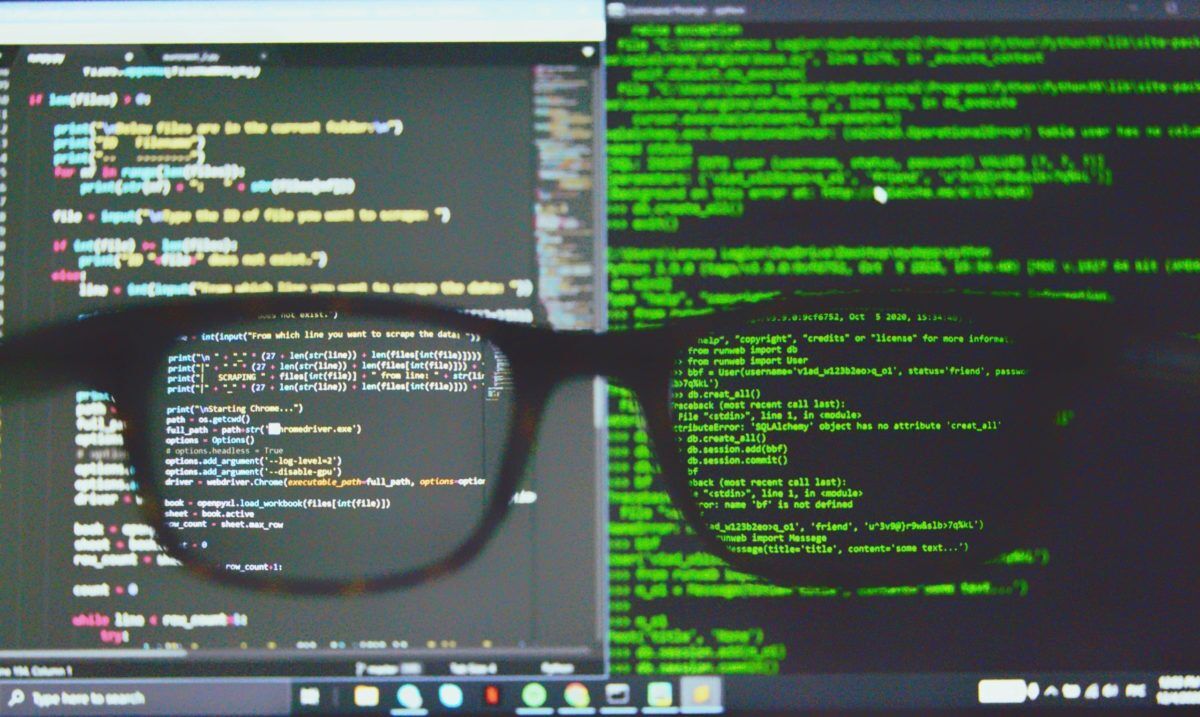Table of Contents
- What Do Computer Programmers Do?
- How Can You Become a Computer Programmer?
- Where Do Computer Programmers Work?
- What Skills Do You Need To Be a Computer Programmer?
- Job Outlook and Salary for Computer Programmers
- The Bottom Line
- Frequently Asked Questions (FAQs)
- What do coders do?
- What programming languages do coders use?
- Do coders work alone or in teams?
- What skills are important for a coder?
- What is the difference between a coder and a software engineer?
- Can coders work remotely?
- What are some common challenges coders face?
- What educational background is required to become a coder?
Are you thinking about becoming a computer programmer? Whether you’re just starting out or thinking about switching careers, it’s an exciting field to consider, especially in today’s fast-paced and always-evolving tech world.
What do coders do? How do you become one? And what’s the pay like? This guide will help you understand this career path, talk about the important skills you’ll need, and give you an idea of what you could earn and what the programming job market looks like. Keep reading to find out!
What Do Computer Programmers Do?
Computer programmers use their expertise to write and test code, enabling computers to perform specific tasks. They employ various programming languages like Java and C++ to translate program designs conceptualized by software developers and engineers into executable computer instructions.
Some of daily responsibilities of coders include:
- Identifying and rectifying bugs or issues in applications by examining and troubleshooting the code.
- Streamlining the coding process by referring to code libraries and utilizing computer-assisted software engineering tools.
- Working with software-as-a-service (SaaS) programs.
- Collaborating closely with web developers and software developers to write code for new programs and mobile apps.
- Updating existing programs by implementing improvements, such as debugging, language changes, and adhering to coding standards.
- Analyzing and resolving errors or malfunctions in program functionality.
- Modifying code to adapt programs for different operating systems.
- Creating technical guides to explain program functionality to users, analysts, software engineers, and other developers.
How Can You Become a Computer Programmer?
Becoming a computer programmer requires acquiring theoretical knowledge and honing technical and practical skills. In this rapidly growing industry, there are multiple pathways to enter.
Below we’ll explore the typical educational qualifications, certifications, and training necessary for pursuing a career in the programming field.
1. Education
Education is a crucial part of the path to becoming a computer programmer. While the requirements can vary, most employers typically expect candidates to possess a bachelor’s degree in computer science, information technology, computer engineering, or a related field.
Some employers may still consider you for a job even if you only have an associate degree, as long as you have relevant programming work experience to make up for it.
When seeking greater opportunities and career advancement, pursuing a master’s degree in computer science can open doors to a range of positions. A master’s degree provides in-depth knowledge, advanced skills, and specialized expertise in complex programming concepts.
2. Training
Hands-on practical training is a crucial aspect of developing the skills needed to become a proficient computer programmer. While classroom learning provides a strong foundation, gaining real-world experience is equally important.
You can acquire training through internships, cooperative programs, or entry-level positions within the industry.
Another way to train in programming is by building a portfolio of programming projects—working on self-initiated coding projects, developing applications, creating websites, or solving coding puzzles.
In addition, engaging in open-source projects or coding communities can help expose you to different perspectives.
Taking these opportunities allow you to apply your knowledge in a professional setting, collaborate with experienced professionals, and gain insights into the practical aspects of software development.
3. Certifications
Certifications are another tool that can boost your credentials as a programmer and demonstrate expertise in specific programming languages or technologies.
Some of the most popular programming certifications that can help validate your proficiency in specialized areas of programming are:
- Project Management Professional (PMP) Certification
- AWS Certified Developer-Associate
- Cisco Certified Network Associate (CCNA)
- Cisco Certified Network Professional (CCNP)
- The Open Group Architecture Framework (TOGAF) Certification
- Computing Technology Industry Association (CompTIA) A+ Certification
It’s important to research and obtain certifications that align with your career goals as well as the demands of the industry.
Where Do Computer Programmers Work?
Computer programmers work in various settings that depend on the nature of their work and the organization they work for. Based on data from the Bureau of Labor Statistics (BLS), the primary industries employing computer programmers are as follows:
- Computer systems design and related services – 32%
- Self-employed workers – 7%
- Finance and insurance industry- 6%
- Manufacturing industry – 6%
- Software publishers – 6%
In such cases, computer programmers typically work in office settings, including the option of home offices for remote work.
What Skills Do You Need To Be a Computer Programmer?
To excel as a computer programmer, you should possess a blend of technical and soft skills. Some of the technical skills you should work to improve are:
- Proficiency in programming languages such as Python, Java, C++, or JavaScript
- Understanding and application of algorithms and data structures
- Familiarity with software development methodologies
- Knowledge of database management systems
- Proficiency in web development technologies and frameworks
Some of the soft skills that will come in handy are the following:
- Strong problem-solving abilities
- Capacity to recognize patterns and trends
- Attention to detail in coding and program design
- Effective collaboration and communication skills
- Strong organizational skills
Remember, this list is not definite, as the specific skills required may vary depending on the programming role or industry. In the rapidly evolving field of computer programming, continuous learning and skill development are vital for staying competitive and adapting to new technologies and trends.
✅ Request information on BAU's programs TODAY!
Job Outlook and Salary for Computer Programmers
The job outlook for computer programmer positions indicates a projected decline in employment opportunities in the coming years. According to BLS for 2022 to 2032, the employment of computer programmers is expected to decrease by 11%.
Regarding the salary, the median annual wage for computer programmers in the United States was $99,700. However, salaries can range significantly depending on industry, experience level, location, and other factors.
The Bottom Line
If you’re interested in programming and thinking about making a career out of it, we encourage you to keep learning and exploring. Even though there might be a decline for computer programmers in the future, there are still plenty of opportunities if you are dedicated and work hard.
Look for great educational programs, get hands-on experience whenever you can, and think about getting certifications that match your career goals. Stay up to date with what’s happening in the industry and keep improving your skills to stay ahead. Start your journey today and change the world with your code!
Frequently Asked Questions (FAQs)
What do coders do?
Coders are involved in various tasks, including:
- Writing and debugging code
- Developing and maintaining software applications
- Creating and managing databases
- Collaborating with other team members like designers and analysts
- Testing software to ensure it meets requirements and functions properly
- Updating and improving existing code and applications
What programming languages do coders use?
Coders use a variety of programming languages depending on the project. Common languages include:
- Python
- JavaScript
- Java
- C#
- C++
- Ruby
- PHP
- Swift
Do coders work alone or in teams?
Coders can work both independently and as part of a team. Many coding projects require collaboration with other developers, designers, and stakeholders to ensure the software meets all requirements and functions correctly.
What skills are important for a coder?
Important skills for coders include:
- Proficiency in programming languages
- Problem-solving and analytical thinking
- Attention to detail
- Understanding of algorithms and data structures
- Ability to write clean and efficient code
- Communication and teamwork skills
What is the difference between a coder and a software engineer?
While the terms are often used interchangeably, software engineers typically have a broader scope that includes designing and developing entire systems, while coders focus primarily on writing code. Software engineers might also engage in project management and systems analysis.
Can coders work remotely?
Yes, many coding jobs offer remote work options. As long as coders have a reliable internet connection and the necessary tools, they can often work from anywhere.
What are some common challenges coders face?
Common challenges include:
- Debugging complex issues
- Keeping up with rapid technological changes
- Managing tight deadlines and project requirements
- Balancing multiple tasks or projects simultaneously
What educational background is required to become a coder?
While a formal degree in computer science or a related field can be beneficial, it’s not always required. Many coders come from diverse educational backgrounds and have gained skills through coding boot camps, online courses, and self-study. Practical experience and a strong portfolio often matter just as much as formal education.











